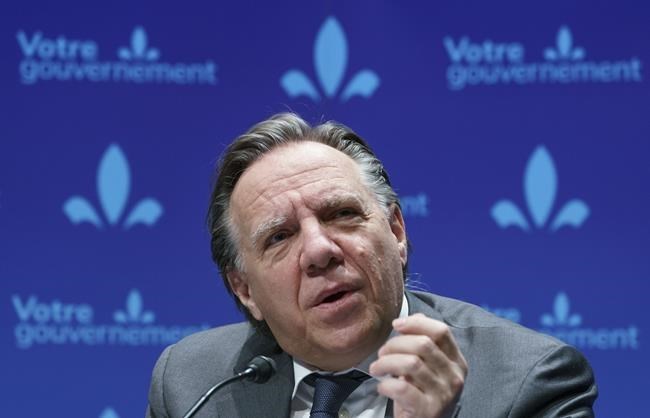OTTAWA — Quebec Premier Francois Legault is shrugging off the suggestion that new federal funding for long-term care homes would have to be tied to national standards.
Prime Minister Justin Trudeau told The Canadian Press in an interview Wednesday that he wants to partner with provinces to improve long-term care as long as national standards can be set and upheld.
But Legault spokesman Ewan Sauves says health care is firmly a provincial jurisdiction and Ottawa's only role is to provide proper funding for it.
Ottawa currently funds about one-fifth of the cost of provincial health-care systems, while the premiers are asking the federal government to cover more than one-third.
"We have heard what Mr. Trudeau said in the last few hours," Sauves said in French in a written statement. "His threats do not impress us. Besides, if the share of federal funding for health care had been increased, we would not be here."
The COVID-19 pandemic has ripped off any remaining confidence in the state of long-term care in most of the country, laying bare the tragic impact from overcrowded and outdated facilities, underpaid workers, and insufficient infection control and safety precautions.
The National Institute on Ageing tracks COVID-19 in long-term care nationally, and reports as of Dec. 17, more than 34,000 long-term care residents have been infected with COVID-19, and almost 10,000 have died. Workers in the homes, often themselves marginalized or vulnerable, have also been put at great risk, with more than 15,000 infected. Sixteen workers in long-term care have died.
Outbreaks have been logged in more than one-third of the homes across the country, and long-term care residents account for more than 70 per cent of the deaths in Canada from COVID-19 to date.
Health care is a provincial jurisdiction, but Ottawa provides some funding to pay for it, with the Canada Health Act governing some principles, including that health care must be universally accessible and paid for by public funds, rather than charges directly to the patient.
However, long-term care is not included within the act, leaving it wholly funded and governed by individual provinces.
Trudeau said this week seniors should expect long-term care systems that treat them with respect and dignity, regardless of where they live. And he said provincial governments that don't step up to improve long-term care will be judged for that by voters.
He said he understands well that long-term care is a provincial jurisdiction but said Ottawa can and wants to help, noting when Quebec and Ontario asked for Ottawa's help in the spring, Ottawa responded by sending in the military to help in care homes overwhelmed by COVID-19 infections.
Sauves said bringing up the military aid was "misplaced" and said long-term care is clearly entirely a provincial responsibility.
Deputy Prime Minister Chrystia Freeland said the tragic consequences of the pandemic should force change.
"I don't think that there is anyone in the country today who feels, after what we've all been through, that the system we have today is good enough," she said. "And I really believe that we can and we will together make a good-faith effort to make things a lot better."
Ontario Premier Doug Ford moved Tuesday to inject up to $1.9 billion more a year into long-term care in a bid to hire 27,000 additional workers.
Most provinces have a combination of publicly and privately owned care homes. British Columbia Premier John Horgan is among those who have called for an end to privately run homes altogether.
This report by The Canadian Press was first published Dec. 17, 2020.
Mia Rabson, The Canadian Press



